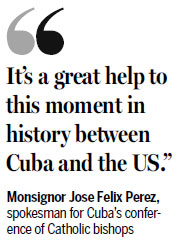NBA leads way in sport diplomacy with training
The NBA is the first US professional league to visit sports-crazy Cuba since the declaration of detente between the Cold War enemies late last year, while the Vatican has announced the pope will also visit Cuba en route to the United States.
Stars will open a four-day training camp on Thursday to wage athletic diplomacy and boost the profile of Cuba's arguably fourth most-popular sport, after baseball, boxing and soccer.
Cuba's men's team finished third in the 1972 Olympics and its women's teams dominate International Basketball Federation play in Latin America, but basketball has been one of the Cuban sports hardest-hit by players' departures for other countries. It's widely perceived to be at a historic low point on a national level.
As part of his move to engage Cuba, US President Barack Obama this year did away with a requirement for athletes to request government permission before heading to Cuba for a sports event.
Vatican spokesman Federico Lombardi said Pope Francis would visit Cuba on his way to the US, but did not give details or dates.
Francis has been credited with helping the US and Cuba reach a historic rapprochement by writing to the leaders of both countries and having the Vatican host their delegations for the final negotiations. Francis' visit to Cuba would be a way for him to push the process forward.

Francis is scheduled to visit three US cities starting around Sept 23.
"His being in Cuba and then going to the US means that he's going to meet both presidents. Symbolically, it's the continuation of what he's done, a message of closing distances between people," said Monsignor Jose Felix Perez, a spokesman for Cuba's conference of Catholic bishops. "It's a great help to this moment in history between Cuba and the US."
The church is planning to restore a dozen more churches, parish houses and other buildings in Cuba as part of quiet reconciliation between the Holy See and the government that has brought relations to a historic high point.
Authorities have also given permission for the construction of the first two new churches in more than five decades.
The church and the Cuban government were in a state of open hostility in the years immediately after the 1959 revolution that put Fidel Castro in power.
AP - Xinhua
(China Daily 04/24/2015 page11)








